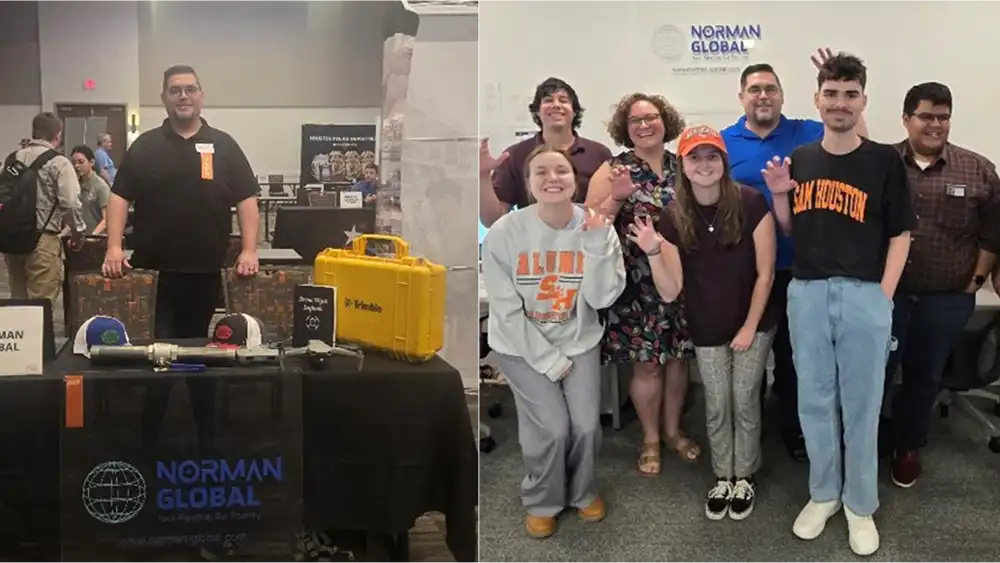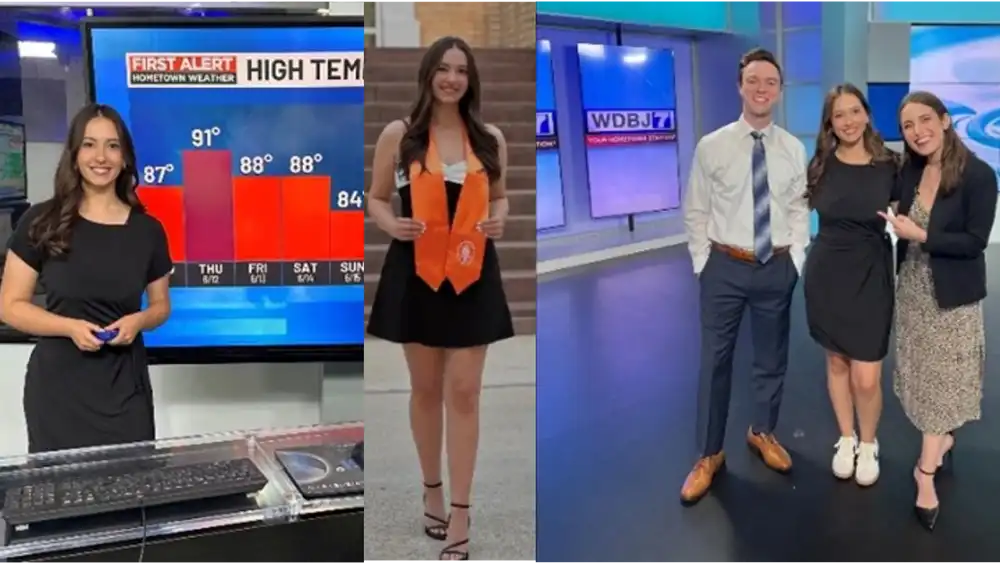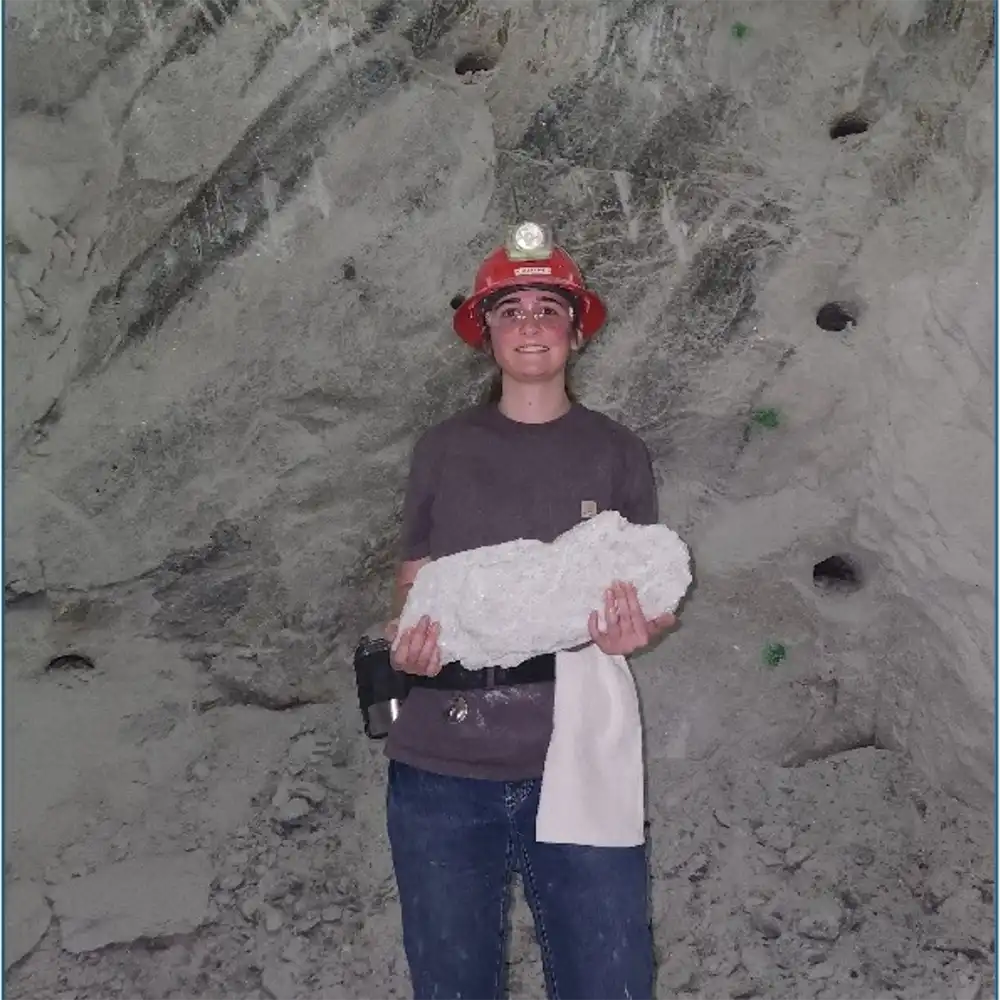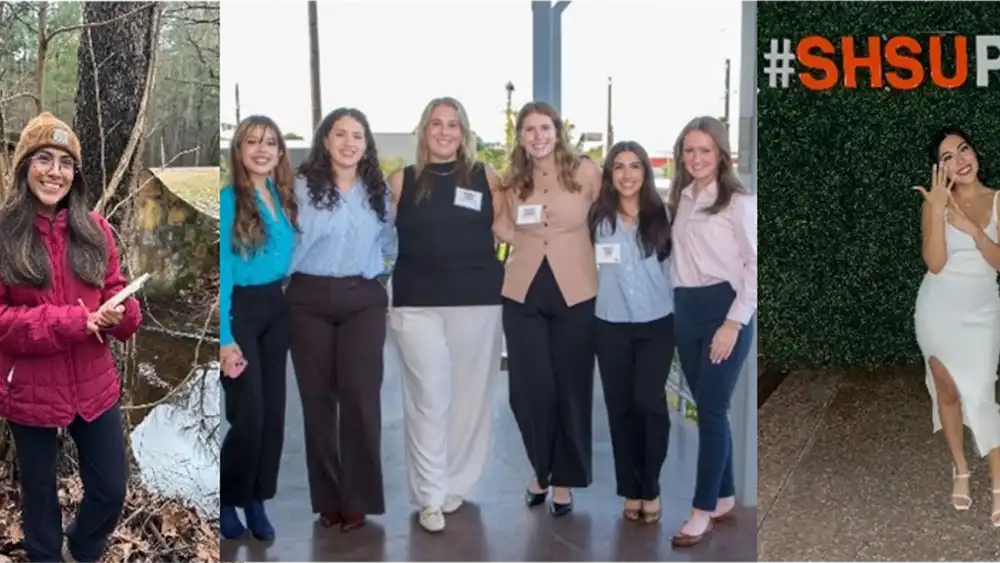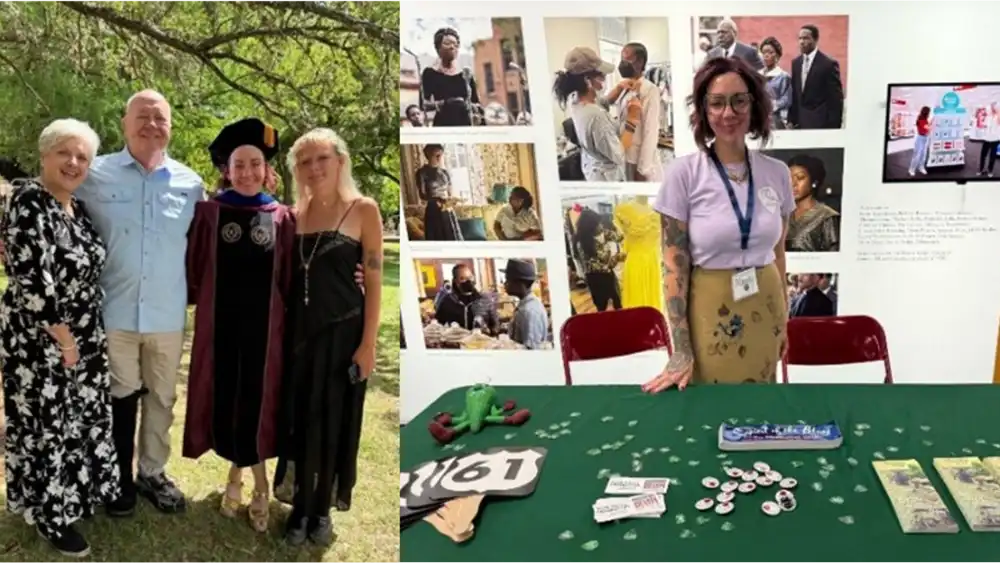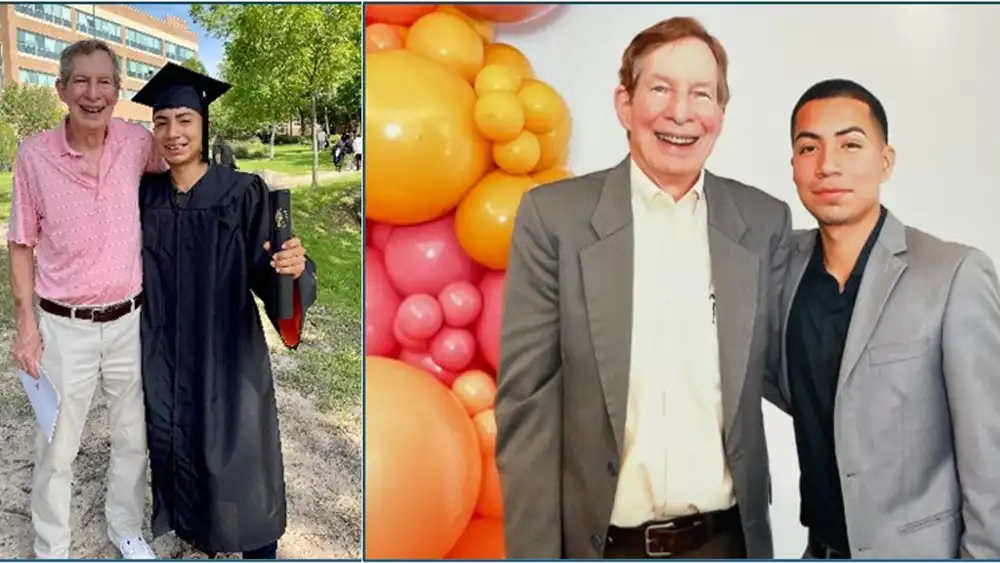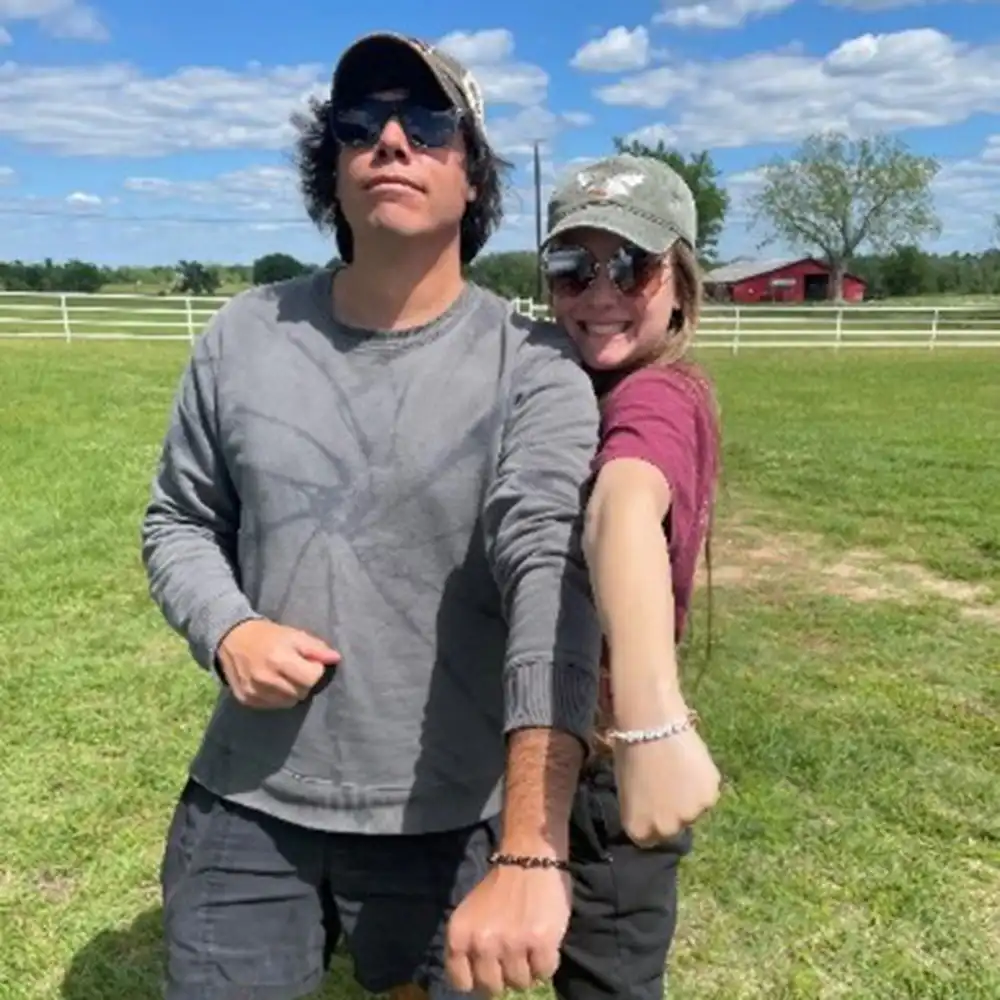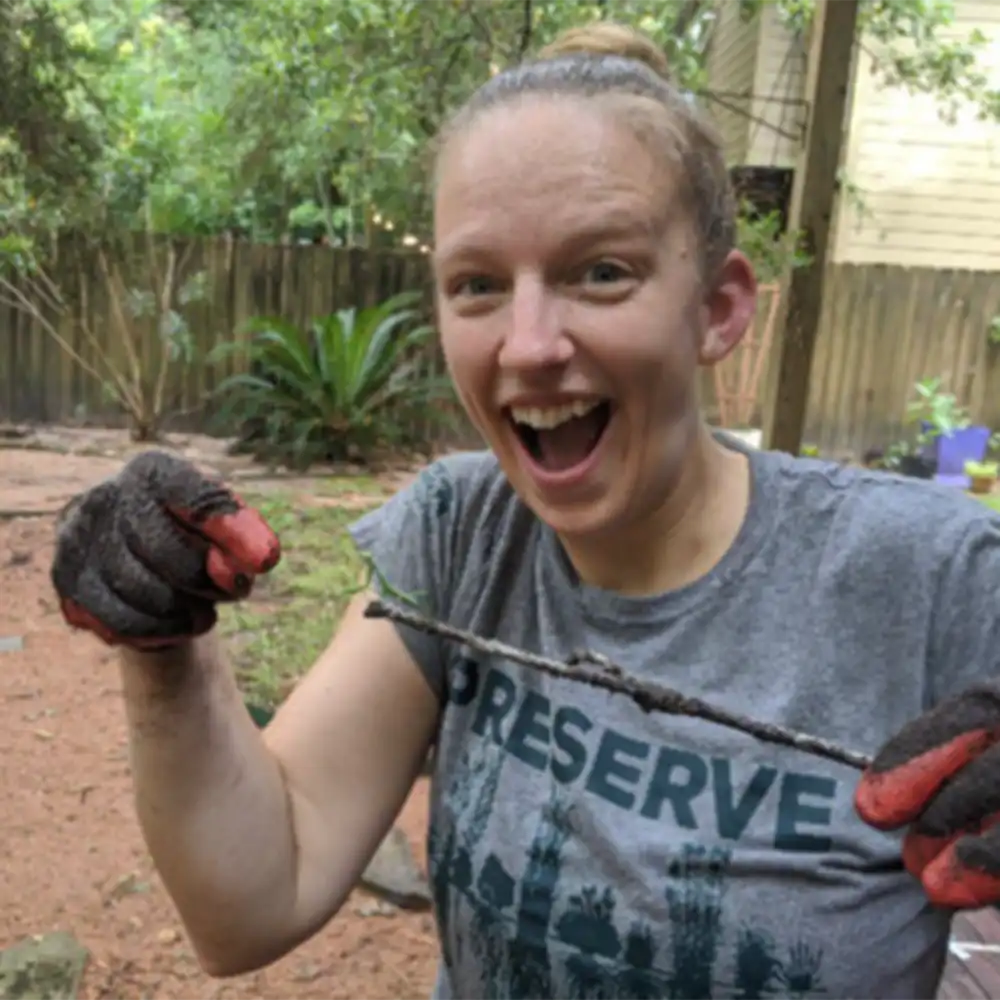Alumni Spotlight
Alumni Testimonials
Hear directly from our graduates about how their experiences in Environmental and Geosciences at SHSU prepared them for success. From hands-on fieldwork to faculty mentorship, our alumni share how the program shaped their careers, inspired their passions, and continues to guide their journey long after graduation.
From Student to Industry Leader
-By Andrew Matej (Geography alumnus ’16)
My journey at SHSU began when a friend in the oil and gas industry suggested I pursue Geographic Information Systems (GIS) training to meet the growing demand for qualified professionals. This advice led me to transfer from a local community college to SHSU, trading a 10-minute commute for an hour-and-a-half drive twice weekly, a commitment that would prove invaluable.
During my time at SHSU, I immersed myself in every geospatial science class I could fit into my schedule while building lasting relationships with fellow students and professors. I was working in the records department of a large oil and gas company when the industry downturn hit, forcing me to adapt quickly. My final semester became a balancing act between working for the SHSU Forensics Department and driving for Uber to make ends meet.
The industry hadn't recovered by my graduation, so I followed my professor's advice to pursue graduate school at the University of North Carolina at Greensboro. After completing my Master of Arts in Applied Science and returning to Houston in 2019, I found an industry ready for fresh talent.
My career path led me from night shifts at CenterPoint Energy locating safety control valves to NuGen Automation, where I discovered the fascinating world of Integrity Management, the vital work of tracking pipeline installations and maintenance across America. When my manager approached me about starting his own company, the timing seemed fortuitous. I later learned I would have been laid off the following week due to a company merger.
As Department Manager at Norman Global, I faced an immediate challenge: filling six open positions. Here, I encountered firsthand the same shortage my friend had warned me about years earlier—too few formally trained Geospatial Sciences professionals. After a year of persistence, I convinced our biggest client to take a chance on recent college graduates.
This decision has transformed our company. The three SHSU Geography graduates I hired have become central to our operations, bringing not only fresh energy but also expertise in the latest software versions and cutting-edge geospatial analysis techniques that proved invaluable during our system migration. Their hands-on training with industry-standard GIS software and real-world problem-solving skills allowed them to contribute immediately—something that impressed our clients and set them apart from other candidates.
The success of these initial hires has enabled us to continue recruiting from SHSU, with three more graduates joining us recently and quickly impressing our clients with their readiness to contribute. Today, nearly half of Norman Global's 23-person team consists of SHSU Geography graduates, and their practical, hands-on training has been instrumental in establishing our reputation in the industry.
What makes SHSU Geography graduates particularly valuable is their ability to bridge the gap between academic theory and real-world application. They arrive with experience in the same software we use daily and critical thinking skills to tackle complex geospatial challenges from day one.
Advice for current students: Focus on mastering the software tools and seek out internships or practical projects. The industry needs professionals who can hit the ground running, and SHSU's hands-on approach gives you exactly that advantage.
Thank you to Dr. John and Ava Strait, Dr. Don Albert, Dr. Mark Leipnik, and everyone at SHSU for helping me reach the point where I can give back to my alma mater. Your commitment to providing practical skills continues to produce the best candidates in today's job market.Finding My Forecast: A Students Path to Broadcast Meteorology
-By Ava Herrera (Geography major, Environmental Science minor, and Weather and Climate TA)
As a freshman, I enrolled in classes offered by the Department of Environmental and Geosciences simply because the subject matter interested me—I had no clue what I wanted to do with my degree. After a few semesters of getting to know the faculty and taking Weather and Climate, I discovered my passion for meteorology.
With the guidance of my advisor and mentor, Ava Fujimoto-Strait, I was able to pivot my Geography degree's focus toward weather forecasting. Soon after, I began working as a lab teaching assistant for Weather and Climate, which taught me skills I use every day in my current career. Through upper-level meteorology classes with Dr. Josh Gilliland, I developed essential forecasting skills and learned to understand the 'why' behind the weather we experience. I never thought I'd see the day where I was eager to do homework—until I took his classes!
During my senior year fall semester, I pursued an internship with KPRC2. Three times a week, I commuted downtown to learn from the best team of meteorologists in Houston, gaining invaluable real-world experience in broadcast meteorology. Before graduation, I landed my dream job in Roanoke, Virginia. I remember reaching out to Ava after my first interview, saying, "If I don't get this job, I don't know what I'm going to do." Thankfully, I never had to find out! A few weeks after earning my Bachelor of Science degree in Geography, I made the 19-hour road trip to Virginia.
I'm currently working as the weekend morning weather anchor at WDBJ7 and loving every minute of it! Yes, I do have to wake up at about 1 AM, but it's totally worth it. The foundation I received at SHSU—from passionate faculty mentorship to hands-on learning opportunities—prepared me perfectly for this exciting career in meteorology.
From Classroom to Career: My SHSU Journey into Subsurface Geology
-By Carolyn Bienvenu (Geology alumna ’22)
I am a subsurface geologist working for United Brine Services Co. LLC, a subsidiary of Texas Brine Company. Together, the family of companies owns and operates numerous salt assets located in Texas, Louisiana, New York, and Virginia. Texas Brine Company specializes in solution mining techniques to create both brine and cavern space within salt structures. The resulting brine is processed and sold primarily for use in the chlor-alkali, drilling, and food industries. The cavern space left over in the salt post-mining can then be used to store large quantities of liquid and gaseous hydrocarbons.
It is my job to evaluate these salt deposits and surrounding sediments/rocks by using and integrating all of the geologic data that is available to me. Subsurface geology relies heavily on the analysis and interpretation of data which can be challenging but also incredibly rewarding. Geologic methods include well log analysis, core analysis, the integration of seismic data with well control, construction of structural maps and cross sections, the interpretation of geomechanical and geochemical data, the interpretation of salt cavern geometry, and much more. I also support various business development projects, including those related to the potential storage of hydrogen gas in salt caverns. Most of my work can be completed from the office, but I do enjoy going out into the field whenever we are actively drilling, coring, or logging.
The Department of Environmental and Geosciences at SHSU has played a critical role in my development as a geologist. I use the fundamental knowledge gained from classes, including Petroleum Geology, Structure, Sedimentology and Stratigraphy, Geochemistry, and Mineralogy, on a daily basis and have continued to build on that knowledge since. The various field trips and field classes arranged by professors at SHSU were also key to my understanding of geology and how to apply my knowledge to the subsurface. I would encourage any current students to build connections with others, study hard (but not too hard!), ask questions, and most importantly, strive to never stop learning!
Finding Her Element: A Transformational Journey Through the Geosciences
-By Jacqueline Lara (Geography major with minors in Geology and Environmental Science alumna 2025)
My name is Jacqueline Lara, and I graduated in August 2025 with a Bachelor of Science in Geography and double minors in Geology and Environmental Science from Sam Houston State University. When I started at Sam Houston in 2021, I was originally a Criminal Justice major—but one required geology course completely shifted my path.
I was immediately captivated by the subject matter. I scheduled a meeting with Dr. Renjie Zhou to explore potential careers in the geosciences, and from there, everything clicked. I found myself surrounded by a department full of passionate professors who truly love what they teach. Switching my major was one of the best decisions I've ever made.
Through my studies, I've had the privilege to travel to incredible places like Hawaii and Arkansas and experience the rich cultural history of Tennessee and Mississippi—including developing an unexpected appreciation for blues music. Some of the professors who made the greatest impact on me were Dr. John Strait and Professor Ava Fujimoto-Strait. Field trips with Dr. Strait were always filled with excitement, meaningful lessons, and a strong sense of exploration that made learning come alive. Professor Ava has been an incredibly supportive mentor throughout my college journey. Her encouragement, guidance, and unwavering belief in me helped carry me through moments when I doubted myself.
Real-World Experience at Quanta Services
For my final task as an undergraduate student, I had the privilege of completing a summer internship with Quanta Services, a leading a energy company that oversees more than 200 affiliated firms across North America. I was placed with Canacre, one of Quanta’s partner companies specializing in land acquisition, environmental permitting, and project management for utility infrastructure.
As an Environmental Intern, I worked on stormwater inspections and traveled to project sites across Texas and the Midwest to ensure environmental compliance with local, state, and federal regulations. This role gave me hands-on experience in environmental fieldwork and a newfound appreciation for the complex systems behind how energy infrastructure works in the United States.
The internship allowed me to apply the theoretical knowledge I'd gained in the classroom to real-world challenges. I learned to navigate regulatory requirements, conduct thorough environmental assessments, and work collaboratively with diverse teams across multiple states. The experience reinforced my passion for environmental science while showing me the practical applications of my geography and geology coursework.
Reflection and Looking Forward
Looking back, this journey has been more than just academic—it's been transformational. I've grown tremendously, both personally and professionally, and discovered a deeper sense of purpose in the work I want to do. The combination of Sam Houston's hands-on approach to learning and the mentorship of dedicated faculty prepared me to excel in a professional environment.
I'm proud of the path I've taken and excited to continue building a career that creates a lasting, positive impact. To students considering a similar path: don't be afraid to follow your curiosity, even if it leads you away from your original plan. Sometimes the most unexpected courses can open doors to your true calling.
Down to the Crossroads: Finding My Path in the Delta
-by Dr. Mandy Truman (Geography alumna with a minor in Geology ‘19)
At 27 years old, I was a single mother working as a hairdresser when I decided to return to school after nearly a decade out of the classroom. Though I enjoyed my career, I felt I had never truly challenged myself academically and often wondered what I could have achieved if I dedicated myself to school. I started with an associate's degree in science from Lone Star College, thinking I might pursue geology. While researching bachelor's programs, I found the geography program at Sam Houston State University. I called the number on the department website, expecting a student worker to answer. Dr. John Strait answered the phone himself. After a short conversation, he offered to meet me at Lone Star College in The Woodlands to discuss the geography program.
Discovering Place-Based Learning
After transferring to Sam Houston State University, I took Weather and Climate as one of my first classes and loved it. I would become a lab instructor and teach the lab portion of the course, providing me with my first teaching experience. Although I was focused on physical and environmental geography, I decided to participate in Dr. Strait's Cultural Field Studies Course on the Mississippi Delta. I expected to learn some geography and visit Graceland but did not expect a truly transformative experience.
I took in every aspect of the week-long trip: the long van ride from Huntsville to Memphis, the conversations among students, the food we enjoyed, the people we met, the landscapes we saw, the music we heard, and the geography we learned. We stayed up late sharing stories and woke up early for full days, exhausted but energized from the night before. I loved every moment of it. I realized the true significance of place-based learning. I understood that what we were experiencing could not have occurred within the confines of a classroom.
One unforgettable moment was our evening stop at Stovall Farm, where the blues legend Muddy Waters lived as a sharecropper. We gathered around the historical marker where Muddy's cabin once stood. As the sun set over the cotton field, the sky continuously changed colors. Dr. Strait spoke about the larger meaning of Muddy's life while "Mannish Boy" played in the background from a small speaker he kept with him. Being in the place where Muddy Waters lived and made music, with the sun setting over the nearby cotton field, created a sense of cosmic energy that is difficult to describe but must be felt in this place.
Before we left the Delta, we stopped at the Delta Center for Culture and Learning at Delta State University. There, Lee Aylward welcomed us with pins that read "I love the Mississippi Delta." She spoke about the Center's efforts to preserve and share the region's heritage through place-based learning, workshops, and tours. I remember thinking that working at the Delta Center—immersed in Delta culture and contributing to preserving such a unique area—would be a dream job.
Following My Passion
The Delta region deeply inspired me, particularly the stories of Black Power, community, resistance, and the celebration of African American culture and traditions. I was profoundly moved by the connections between the physical landscape, the history of power relations, and the Black people who fought for freedom and shaped such a rich culture. The narratives of resistance and the courageous individuals who took on leadership roles during the Civil Rights Movement deeply impacted me. I was intrigued by how the culture of resilience resonated through the blues music of the Delta. These connections ultimately motivated my academic shift toward cultural geography.
I realized I wasn't finished with my education or exploring the geography of the Delta and wanted to continue my studies. I applied for the master's program and an assistantship position in the Geography and Environmental Studies Department at Texas State University. After being accepted, I met my advisor, Dr. Eric Sarmiento. We not only shared similar academic interests, but he was also a musician, which added a unique perspective to my research into Delta blues.
The research for my master's thesis developed during the later stages of the COVID pandemic. I decided to examine how the pandemic affected blues musicians in the Mississippi Delta. I spent two weeks in the Delta interviewing musicians, business owners, community members, and city officials to gain a deeper understanding of the city's challenges during this time, and how people from different socioeconomic backgrounds were impacted disproportionately. Dr. Strait served as an external member on my thesis committee.
Doctoral Research and Fellowships
This experience intensified my desire to keep studying the Delta. I applied for the doctoral program at Texas State University to continue working with Dr. Sarmiento. To support my dissertation research, I was awarded the Study the South fellowship from the University of Mississippi and a fellowship from the Society of Women Geographers. These fellowships funded a three-month stay in the Delta during the summer of 2024.
My research focused on the development of tourism in Clarksdale, Mississippi. I explored the history of the New World District, historically the Black part of town, during the era of segregation. This district played a crucial role in the development and evolution of blues music and was central to the city's civil rights history. While downtown Clarksdale has thrived and grown due to the rise of blues tourism, the New World District has been left to deteriorate. I conducted over 55 interviews and collected oral histories from individuals who remembered when the New World District was "the place to be." My time in the Delta highlighted the power of lived experiences and community memory.
Everything Falls Into Place
Events in our lives often align, leading to things falling into place as they are meant to. While writing my dissertation, I learned that the Director of the Delta Center for Culture and Learning was leaving for a new position, and Delta State University would soon be searching for a new director. I decided to apply, and during my interview, I was asked about my experience in Dr. John Strait's geography course. I knew the hiring committee viewed that experience as valuable for the position. I was offered the role as the new Director.
Within one month, I defended my dissertation, graduated with a Ph.D. in Geography, packed up my house in San Marcos with my daughter and our pets, moved to Cleveland, Mississippi, and began my career as the new Director of the Delta Center for Culture and Learning—just two days after arriving.
It has been a whirlwind filled with excitement, uncertainty, stress, and joy. Although I started my academic journey with no real plan, I allowed my path to be shaped by the experiences I encountered, the people who impacted me, the content I was learning, and the opportunities that presented themselves—leading me to exactly where I was meant to be.
The Chuck Caughey Geoscience Endowed Scholarship
-By Marcos Jimenez (Geology major and Geography alumnus - 2024)
I am extremely grateful for the opportunity I received from SHSU to obtain my B.S. in Geology. It all started with being the inaugural recipient of the Chuck Caughey Geoscience Endowed Scholarship, which allowed me to attend school with full focus. This scholarship provided financial support for my housing, meals, textbooks, and transportation. Mr. Caughey is an amazing mentor who continues to support the next generation of geoscientists, encouraging us to seek greatness and exceed our limits.
At SHSU, I experienced my first camping trip to Arkansas. Each fall, Dr. Harris takes his students for a few days near Magnet Cove. During the trip, I collected minerals in the field - pyrite, rutile, calcite, and beautiful clear quartz. Since then, I've been obsessed with minerals and Mineralogy as a whole.
I also cherish the memories from the Spring Break Grand Canyon trip in 2023. Dr. Hill coordinated everything so well that we had an amazing experience. It was my first long road trip with so many geological sites to see. Ending almost every night with a campfire, surrounded by other passionate geologists, was the best feeling ever.
From the moment I was welcomed by Dr. Cooper, Dr. Moss, Dr. Zhou, and everyone in the Department of Environmental and Geosciences, I knew this was the perfect place for me. Without a doubt, there could not have been a better place for my undergraduate studies than SHSU. I am happy to close this chapter in my life, but it will forever live within my heart – memories made in the classroom, meeting other students, long nights in the lab, and always a geologist's favorite: "out in the field". My goals for the upcoming years include completing my master's degree at The University of Texas at Austin, applying to work at an energy company, and giving back to all who have given so much.
Finding Purpose Through Second Chances
-By Paige Kempker (Environmental Science alumna ’22)
I graduated high school in 2015 in the top quarter of my class—an overextended student athlete who played school and club volleyball, took all AP and honors courses, worked after school and weekends, and somehow maintained a vibrant social life. By graduation, I was completely burnt out.
The pressure to decide your life's path after high school felt overwhelming. Away from the support system that had always pushed me to excel, I found myself facing new temptations and personal challenges. The combination of burnout and these pressures led me to give up on school entirely. I stopped attending classes and focused on working to earn money for fun. This seemed fine until a couple of years passed and I had to face the consequence of failing out of college. Having that conversation with my parents was one of the hardest moments of my life, and their disappointment is something I'll never forget. Looking back, I wish I'd had the courage to speak up after my first year to say I needed a break. But the damage was done, and I knew this was my last chance to make things right. My parents' forgiveness and support during this difficult time meant everything—I wasn't going to fail them again.
I went to the SHSU campus and spoke with the Associate Dean of the College of Science and Engineering Technology about what it would take to raise my GPA for enrollment eligibility. After completing a semester at Lone Star Community College, I enrolled in Spring 2021 as an Environmental Science major.
Initially, I approached school with the mindset of simply finishing to close this draining chapter of my life. I felt woefully unqualified for several courses, but Professor Ava Fujimoto-Strait's Environmental Geography class was different, it was one I always looked forward to. Since childhood, I'd been fascinated by science and nature, and this course reignited that passion. In such a competitive academic world, it's easy to feel like a failure after hitting such a massive bump. It's easy to believe there's no coming back, that you'll never achieve greatness. But when I met Professor Ava as my advisor, I encountered someone who knew my academic history but still saw potential in me—something I never thought I'd experience outside of my family. To my amazement, she asked me to be her Weather and Climate Lab Teaching Assistant and invited me to enroll in her Hawaii Field Course the following semester.
From that moment, my outlook on life and school transformed completely. Being a TA gave me purpose beyond myself, opened countless doors, and introduced me to an incredible group of people I'm still friends with today. The Hawaii Field Course was life-changing—filled with education and some of my greatest memories at SHSU. I also met my boyfriend Justin Arroyos, an Environmental Geography major, that semester, and we've been together ever since.
I began excelling in classes I never would have dreamed of succeeding in and graduated with a near-perfect SHSU GPA in Spring 2022. I went on to Western Colorado University for graduate school, earning a 4.0 in their Master’s program in Environmental Management, while Justin remained at SHSU as a Graduate Assistant in the Graduate GIS program. The long distance was challenging but necessary for us to achieve our personal goals—we're better and happier for it. We're now planning our future together, and I can't wait to see what's in store.
Today, I work in Public Water Supply for the Texas Commission on Environmental Quality (TCEQ) alongside at least six other SHSU alumni—a place in life I couldn't have dreamed of when I was at my lowest point.
For students facing challenges: Don't ever give up on yourself. There's always another opportunity to seize—you just have to be willing to put yourself out there. If you have the chance to be part of the Department of Environmental and Geosciences at SHSU, get to know your professors! They possess vast knowledge in their specialties and are incredible people who truly care about their students' success and well-being. SHSU is one big happy family, and I'm so grateful to have been part of it. Sometimes the most winding paths lead to the most meaningful destinations.
Senior Spotlight – Amber to the 2nd Degree
-By Amber Hrynczyszyn (Environmental Science major [2025] and Music major [2011])
My adventure, that is my second adventure, at SHSU started in Fall of 2020. I could not have chosen a better
time to go back to school: COVID was in full swing creating panic, fear, and major disruptions to all aspects of our lives, and I had a full-time job in Houston. Classes were moved almost exclusively online or converted to disjunct hybrid situations. And I grossly underestimated the intensity of 100-level classes. As an already degreed person, I made the misguided assumption that classes intended for students fresh out of high school were no match for a fully-fledged adult. Boy howdy, was I wrong. Mountains of flashcards and late-night study sessions quickly became my norm. After the initial adjustment to life as a student again, the online/hybrid experience actually worked to my advantage, allowing me to work as an interior landscaper with minimal interference and complete most of my schoolwork at night and on the weekends.
The guidance I received from my advisors made all the difference in my SHSU experience. Dr. Ross Guida and Ava Fujimoto-Strait helped me select classes that not only fulfilled requirements but also genuinely interested me and supported my future career goals. Ava introduced me to field courses where I had the opportunity to travel to both Costa Rica and Hawaii. While I was solely focused on checking all the boxes to get my degree, their guidance helped me discover classes that would truly shape my academic journey. My favorite class throughout this degree was Entomology with Dr. Sibyl Bucheli. When I first got the idea to go back to school, I thought I wanted to be a botanist, but after many hours playing in my garden, I realized I'm even more curious about the critters in and around the plants. Day 1 of entomology and I was hooked—I knew I wanted to be an entomologist. My last full semester brought another turning point in Evolution with Dr. Jerry Cook, where I was given the opportunity to work in his lab, helping to identify an undescribed species of Strepsiptera—probably the most exciting thing I've worked on my entire undergraduate career.
As I anticipate graduation, I still haven't fully digested that this 5-year journey is coming to an end. Because of work responsibilities, I was only able to take 2 classes per semester, and in 2022, a heart condition requiring surgery forced me to take a year off from SHSU. While I have questioned my commitment to this journey many times, I am grateful that I saw it through to the end. I could not have accomplished this without my amazing husband Michael and my wonderful bonus daughter, my incredible professors and advisors at SHSU, and my unbelievably understanding employer. I am planning on taking a year or two "off" and then hope to pursue graduate work at Rice University.
